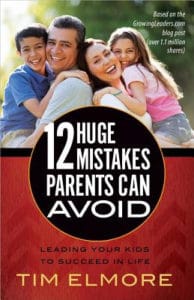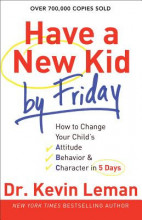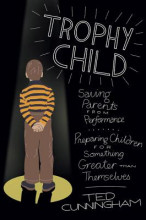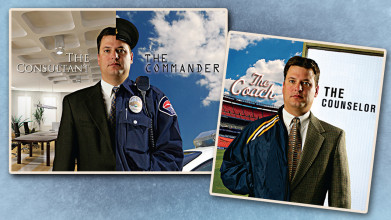Opening:
Teaser:
Man #1: Well the one mistake that I made as parent was letting my oldest son watch the “Ghostbusters” movies. He was scared out of his pajamas after that.
Woman: Being too focused on wanting their behavior to be good and not realizing they needed to just be kids.
Man #2: There was a time when my daughter was younger where she was acting up. So I said well if you don’t smarten up I’m going to take you to the police department. She didn’t smarten up so I thought, “Now what do I do?”
End of Teaser
Jim Daly: Well, I’m sure you can relate to that. I know I can as a father of two teenagers. And there are no perfect parents. I say that so often here on Focus on the Family and today we’re gonna be honest about some of the common mistakes we make as parents. I’m Jim Daly. Here in the studio with me is John Fuller and John, do you want to confess about any of the mistakes you made as a parent?
John Fuller: No I really don’t! (Laughter)
Jim: See, we kind of swap roles here.
John: Not at all here. (Laughter)
John: Now I think every parent has stories. You know you go to bed thinking I really blew that. (Laughter) And I think probably my earliest memory, one of my earliest memories would be when my oldest was 4 and I remember I was, I think I was yelling at him, but I had this raised voiced. And I said how many times do I have to tell you and he’s just 4. He’s looking at me like what? And I had this expectation that he should get it ’cause I told him.
Jim: We had that–
John: It was a wrong expectation.
Jim: –we had that problem, too. Trent had a little texture sensitivity issue, but I didn’t know it. Jean didn’t know it. He’s probably 3 or 4. He would go bananas washing his hair in the tub. And I just got so frustrated and I just said, “Come on. I need to clean your hair.” “Why Daddy? Why Daddy?” And then by about 5, I was thinking he didn’t enjoy brushing. I thought these were just normal kids things, you know. [He] didn’t like lotion. Didn’t like brushing his teeth.
John: So he had some sensory issues
Jim: He did. We finally got it diagnosed and oh, I felt so guilty. All those battles I had and that is tough stuff, but you gotta be that engaged parent to see those cues and know what your child is going through.
And you know, that’s part of the big journey. The good news is we can take comfort in the fact that we’ve all failed our kids at times. That is normal and sometimes we can fail them in ways that we don’t even see and what we want to talk about today are the biggies–those things that we need to avoid in order to be better at parenting. There’s no formula and I want to say that again. We talk about it quite often. In the Christian community we can tend to think it’s formulaic and you know what, you can do everything well as a parent and still have a prodigal child and I’m sure we’ll get into that today, as well.
John: Well we have Dr. Tim Elmore with us and he’s the president and founder of Growing Leaders, which is an organization that works in high schools and colleges, churches and even with some major athletic organizations to equip and train and mentor future leaders and he does a lot of writing and speaking and we have a book that we’re gonna be exploring today along these lines. It’s called 12 Huge Mistakes Parents Can Avoid: Leading Your Kids to Succeed in Life. And Jim, I think I’ve made all 12 of those mistakes at least 1 or 2 times.
Jim: You’re such an honest guy. I was fessing up to about 3 of them. (Laughter)
John: Well, than you should take the lead I think. (Laughter)
Body:
Jim: Yeah, great. Tim, let me welcome you back to “Focus on the Family.”
Tim Elmore: Thank you. It is so good to be with you guys and laugh together, too.
Jim: This is such a hot topic, especially for us who are still in the throes of parenting. You don’t really end and I know some listeners probably have 20 something, 30 something children and when I talk to them the good news I guess is, you don’t stop your parenting when they turn 18 and leave the house.
Tim: That’s true. Yeah.
Jim: So everybody is impacted by this and we’ll talk about that spectrum today and those mistakes not to make hopefully. For the sake of disclosure though, Tim, I gotta start with the obvious question. (Laughter) Of the 12 that you highlight in your book, the 12 Huge Mistakes Parents Can Avoid, where did you fall short?
Tim: Well, in the very first chapter the mistake No. 1, I talk about how we don’t want to let our kids fail.
Jim: Yeah.
Tim: Because it’s often a reflection on we’re bad parents if they’re failing either in school or in Little League. And I tell the story of Jonathan, my son, who I wanted so desperately to be good at baseball (Laughter), because I’m a baseball nut. Well he is, he’s a “mathlete” not an athlete. You know he’s–
Jim: A mathlete, I like that.
Tim: –yeah, he’s just better in school and thinking and so forth. But I mean, I made it almost impossible for him to fail. And then of course, I helped coach the Little League team and you know he’s staring at dandelions and looking at his mitt. You know, what I’m thinking.
Jim: Was that 5-years-old?
Tim: Oh yeah; oh yeah. 5 or 6. (Laughter) And I’m expecting Derek Jeter to come out of the woods here, but you know, we laugh at that, but it was a well-intentioned mistake. All these mistakes, guys, I think I list in this book is because we’re trying so hard. I think people listening right now they’re listening ’cause they want to do it right, but sometimes we over function as parents. And the removal of failure as you well know completely diminishes the value of success and working for something, so anyway.
Jim: Well, It is one of the problems that we face. I remember with Trent my oldest, I took, signed him up for Little League. This is it. Man, he’s 5-years-old. We’re gonna start with tee ball and then he’ll play for the Colorado Rockies, I’m sure.
Tim: (Laughter) Yeah, that’s right.
Jim: And so we’re out there. The first day it was so funny and you know, if you’ve ever done this, when the ball is hit all the players, if they’re playing third base and the ball is hit to right field, the third baseman runs out to right field!
John: They all run that way. (Laughter)
Jim: And you’re looking at this goin’, “Okay, that’s not how it works.” So my son was actually the one picking at the dandelions. He was picking them up and blowing them and balls were going by him. And I remember and some people may disagree with this. I just remember looking at saying, “Hey, would you rather get a milkshake?” And he goes, “Oh dad, I’d love that.” And I didn’t push him and we walked away.
Tim: Yeah.
John: That was the end of his baseball career.
Jim: And he’s never picked it up. Now Troy my next oldest, my 12-year-old, this year, without being pushed he said, “Dad, I think I’d like to try baseball.” And then my heart sank because I was thinking, “You know, Troy you’re gonna be playing with kids that have been playing for the last seven years. Are you sure?” And he said, “No, dad.” And this was what was great. He said, “No dad, I know this will be year I can learn. I probably won’t even bat or make the lineup, but that way I could at least learn how to play.
Tim: That’s perspective.
Jim: I went, “Hey, with that attitude, you’ll do fine, so go get ’em.” And I’m proud to say he’s batting 500. (Laughter) But that perfection thing, that really can paralyze us can it?
Tim: It can in fact my thought is that we not only have a new generation of kids in our hands today growing up with portable devices in their hands, we have a whole new generation of parents. And I think in many cases, certainly not all. It’s a pendulum swinging back and forth.
We’re reacting to perhaps we didn’t do enough in the ’60s and ’70s, those Boomers when they came through. And now we’re so over functioning, filling out forms or running the backpack down to school because they forgot it, rather than saying, you know what, it probably good for them to have a hard day and never forget that backpack again ’cause they didn’t rescue.
So I’m saying all this because I love kids, not ’cause I’m mad at them. I’m actually saying, “Parents, let’s think about long term. The further out we can see the better decision we can make today.”
Jim: Tim one of the one of the areas that I’ve noticed, you know we’re in a charter school and people are kindly competitive and I remember the first science project that at the time Trent, I don’t know, fourth grade, fifth grade, I can’t remember when he went through that. He’s in the big ninth grade now. But looking back on that experience, I remember talking to Jean and I said Jean the one thing we’ve got to try not to do is do the project and actually hands on do it. And I remember they had a great evening for the parents to come and look at all the science projects. And they had the judging and all that and you could clearly see who’s dad and who’s mom. (Laughter)
Tim: Had gotten involved.
Jim: Yeah. This was a rocket ship that was built and it was built from scratch from some actual astronaut–
Tim: Yeah, yes.
Jim: –that went to the Air Force Academy. But you’re just going, “Wow, okay.” And ours looked, you know, ours meaning Trent’s was not that sophisticated. He did a great job for his age. But I just said, let’s not jump into that. And talk about that aspect of it. I mean there’s other things [sic] that I’ll jump into.
Tim: Sure
Jim: I don’t want to paint a picture of perfection.
Tim: I love the case study you just brought and here’s why. It’s an illustration of what I just said. The further out you can see the better the decision you can make today. That was a great resolution or solution for today. The kid probably got an A++++. Dad did well, but did the child really get you know, learn what he needed to learn? So story after story. I cite them in the book. You hear about parents that are sitting in Starbucks doing homework for their kids. This happens all the time
Jim: Wow
Tim: Yeah. Or there have been—it’s a record that I know–two Easter egg hunts in past Aprils where the parents, well, they canceled the Easter egg hunt because the parents were knocking over children getting eggs for their own kids. (Laughter) Now I’m thinking, what in the world has happened? Well, I’ll tell what’s happened. We want so to help our kids get that advantage or that, you know, that break and I’m thinking but they’re not learning.
Jim: Yeah.
Tim: They’re getting the breaks and then they expect a break from their boss at 25. And he’s not clapping for him when they go into work, you know, on time and there’s no trophy waiting for them. You know what I’m saying.
John: Is there any balance here though Tim? I knew a dad who, his daughter was in high school and she could not write a paper to save her life. And you can’t wiggle out of that. It’s not like change schools or something like that. So he was really doing a lot of the work for her. Is there is there a place for some compensation or some assistance. What does that look like?
Tim: Absolutely. I think it I think we definitely need to step in. In fact, I think we’re a bad parent if we just say, “Hey, figure that out.” I think what we need to keep in mind is that long term thinking again. If I look outward and I don’t help that’s not gonna look good either. You know what I’m saying?
Jim: Sure
Tim: She may never learn to do this.
John: Yeah.
Tim: So maybe I either help a bit and say why don’t you take your first take stab at it. Bounce it off of me. And then I’ll give you my, you know. So it’s a volley. Or maybe I do get a tutor who knows this and I say just before you begin just know don’t do it for her. You know, this is what you need to do. So it’s help and they don’t feel like an orphan but at the same time I’m not I’m not doing it for them and now they’re complete skill-less. They need to have that skill.
Jim: Well and I’ve observed that with Jean. Thankfully she’s the math whiz in our family. Biochemistry was her background…
Tim: Yeah, yeah.
Jim: So she can help Trent and Troy really set the problems up. And it takes some time. I’ve noticed that as she’s doing it. And–
Tim: Yeah.
Jim: –she will articulate the problem. Well, what if you think about it this way?
Tim: Yeah.
Jim: Or if you use the “if-then” formula. Does that work?
Tim: Yeah, yeah.
Jim: That takes a lot of patience–
Tim: Yeah, it does
Jim: -’cause it’s so much easier to just do it, but you’ve gotta let them stretch and I give Jean great kudos because she is really patient with the kids when it comes to math.
Tim: Yeah.
Jim: But in that context, that can be you do need to assist, but don’t do it for them.
Tim: Absolutely. In fact that’s one of the mistakes I talk about in the book. We do it for them. And I understand as a father why we might do that. But again I go back to we’ve been far much better I think at preparing the path for the child instead of the child for the path.
Jim: Right
Tim: And if I’m thinking trainer, trainer, trainer. I’m a lover, but I’m also a trainer. Now I’m not making some of those mistakes that I would unwittingly make because I lack patience or time. I’m thinking no, this may not look perfect today, but boy, they’re learning to make the bed or they’re learning to put the toys away or whatever. I think that’s what we gotta do.
Jim: Tim, let me ask you this because again I’ve said it, but in the Christian community we can be really tough on our expectations–
Tim: Yes.
Jim: –of our children. We want to strive for perfection. There’s no doubt about it. It’s part of our DNA. You know, as we become Christians, we want to act the right way, behave the right way and then expect our children to do the same. And that can be tough on the kids. I think a lot of the brokenness that we see in Christian homes today is due to that high, high, high bar that is set. Yet, at the same time you hear experts talk about the fact that people, children learn through failure.
Tim: Yeah, yeah.
Jim: And so, it’s kind of this dichotomy. We are parenting–
Tim: Yeah.
Jim: –for the success of the child in the moment. We want them to be—
Tim: Exactly.
Jim: –successful in elementary school, successful in high school–
Tim: Yeah.
Jim: –and we haven’t prepared them to be successful in life.
Tim: No
Jim: Talk about that.
Tim: Well, I do I do argue that very point. I, at one point in the book, I actually can’t remember which chapter, but I talk about parents need to have a tender balance of being responsive and demanding. And if you put them together, it’s a wonderful; it’s a velvet-covered brick. It’s Jesus! You know He says where are your condemners? Go and sin no more. There’s the velvet. There’s the brick. There’s the response and the demanding. So, we can be perfectionists. We can put our kids in performance trap unwittingly.
But I think what we need to do is absolutely convince them, you, I’ve got your back. I love you. I care about you. I understand you. And then at the same time here are standards that we know you are capable of. I wouldn’t call you to something you weren’t capable of, but if you are I’m not gonna let you have a mediocre performance when I know that you can do better. Those, that balance is huge.
Jim: And it’s really important. And I think we get blinders on as parents–
Tim: Yeah, I do too.
Jim: –where we fall into a rut on either side of that and we get comfortable in that demanding side or the forgiving side and we don’t reconsider what are we doing. In fact you say in the book that parents give themselves A‘s but the parents of their children’s friend, well they give them a D. Why do we look at it like that?
Tim: Well, my thought is we tend to judge ourselves with our heart and others with our head. You know like they need to get that kid whipped into shape, not thinking about the hard day they might have had. We have no idea that they may have just lost a grandmother. You know something happened. But we know what happened in our lives, so we go, “They have no idea what I went through today. It’s lucky I’m, you know, we got to Friday and nobody got hurt, you know?” So I think that’s what happens. So we need to obviously give grace to others. Maybe what we need to do is flip flop that. Judge ourselves with our head and others with our heart and to have a little more grace for maybe they had a hard day too.
Jim: Tim, you also say in your book that about a third of the parents admit they’re not good role models at home. That really got me to thinking whether or not I think you put this challenge in your book. You might want to ask your kids about your grade.
Tim: Yeah.
Jim: That’s called a 360 degree review job description.
Tim: It’s true
Jim: I thought about that. I may do that. Any help you can give in how I would approach that? If I went to my 14 and 12 year old and said, “I want you to give me a grade. A to F—
Tim: Yeah.
Jim: –how am I doing as your dad?” How could I structure that in a way that’s helpful for me and helpful for them so they can understand what I’m getting at?
Tim: Well, it’s a great question. And I think the first thing is most kids are afraid to actually be blunt right away although your boys may not be afraid to be blunt.
Jim: I think they got the blunt bone!
Tim: Okay, okay. I think what we need to say is, they’ll often go, “Well, what do you mean?” And maybe you need three or four specific areas–
Jim: Like examples.
Tim: –like am I helping you get ready? For a do you feel like you are getting ready?
I remember I did dates with my kids all through their growing up years. I tried to do it on a weekly basis and I would ask them, “Jonathan do you feel ready for the next step? Do you feel …? “Well, Dad I don’t understand checkbooks.” “Okay, let’s talk about that.” And he got the place where he could tell me where he wasn’t doing well. And I remember guys the first time I noticed they were getting good at being in front of screens, but they weren’t too good with interpersonal skills and emotional intelligence. So we threw a party, my wife and I for our adult friends and had our kids at 8 and 12 host the party.
Now they rolled their eyes and thought, “Oh my gosh, this is so stupid,” but you know what they got good at doing? “Hi Mr. Johnson, come on in. Have you met Mrs. Smith? Can I take your coat? Would you like some ice tea?” And now they’re both gainfully employed. You know, so I think those kind of skill sets come when we realize where they’re short and maybe do be a better trainer for them.
Jim: Let me ask in that area because I think a lot of the parents who have teenagers–13-, 14-, 15-year-olds are worried about because of the competition with the screens and social media. What are some additional things they can do beyond just hosting a party like that?
Tim: A couple of thoughts and again I don’t think I’m brilliant at this. I’m still on the journey, but one thing we decided was to say whatever, however many hours you have in front of the screen, say a video game, you have that many hours face to face with real people–reading body language building. You know, you know what I mean, all the non-verbal stuff that’s so important.
Jim: Could you actually keep track of that?
Tim: Well, it was on the honor system. And the kids were old enough. Are kids are now 20-somethings so they were on the front end of some of this. But we said Jonathan how many hours? Well, I had two hours videos today. Well, okay, well, I want you two hours not in front of the video now. They need to be good. Technology is not going away, but I wanted them to have the soft skills and emotional intelligence–
Jim: Yeah.
Tim: –that they would need to look an employer in the eye, shake his hand and say “How are you doing, sir?” You know, I wanted that to happen.
Jim: John, going back to the grading. You’ve got older children. You’ve got kids in their 20s. If you went to them today and said give me a grade, first would you do it? And secondly, how would that conversation go with older children?
Tim: Yeah, we haven’t had that exact conversation but my two oldest have affirmed us as generally doing a good job in parenting. They’re in their 20s. The second one in particular said, “You know, you made it kind of hard for me to want to stay in the home when I hit about 20-years-old. You kind of pushed me out gently.” And he said, “Thanks for doing that, because I’ve got friends who are still kind of stuck at home and they’re–
Tim: Yeah.
John: –they’re not sure exactly what they’re doing.” So it wasn’t a huge, “Hey I’d give you a–
Tim: Yeah.
John: –grade of A, but it felt like, okay, there was some affirmation there.
Tim: Yeah.
Jim: They’re recognizing the good stuff.
John: Yeah and I’ve maintained all along that they have forgotten most of our mistakes it seems. (Laughter)
Tim: Isn’t that great?
John: I don’t know how God works that out but–
Tim: Yeah, yeah, yeah.
John: –kids forget so many of these mistakes that we make.
Jim: We’re hoping for that for sure.
Tim: Yeah, absolutely, amnesia to set in, yeah.
John: It’s a wonderful gift.
Jim: Tim talk about that in terms of the inability to launch, those parents who in essence begin to overparent at 18, 19.
Tim: Yeah.
Jim: You know we’ve had professors from universities here on the broadcast here say that they’re shocked that moms and dads, particularly moms, will call to talk over their academic performance of their kids. And they’re saying, “I can’t. It’s not even legal for me to talk you about these things.”
Tim: Yeah, this kid’s not a minor.
Jim: But we’re acting as if college is now the new high school where parents still have a role there. That’s not the way it works.
Tim: I have lost count of the number of university deans that have said to me 26 is the new 18.
Jim: Yeah and that says it.
Tim: Really eerie to me. Yeah. So it’s not in cognitive ability. It’s an emotional maturity. And it’s because we’ve often done so much. So can I give you a case study that we may want to bounce off each other? [I] got an email from the University of Syracuse. It was a faculty member that teaches freshman students. She handed her first set of tests back to the kids and one of the girls in the class got a C-. Well, she had never gotten a C– in her life up to that point. So she had a meltdown right there in class. That’s problem No. one. If you are having a meltdown over a C something’s wrong. Meltdown.
The first thing she thinks to do is reach in her backpack, pull out her cellphone and text mom, right there in text. So mom texts back call me right away. So she calls mom right there in class! You know class has to stop because you know she’s got her phone call to make.
Jim: Oh my goodness.
Tim: And if that’s not bad enough she goes, “Okay mom.” Hands the phone to the teacher and says “She wants to talk to you.”
Jim: The middle of class?
Tim: Yep. Now mom’s gonna negotiate a B– out of that C-. I wish I could tell you this was an isolated incident. It happens hundreds of thousands of times a year. Now you and I both know that’s a well-intentioned momma. She’s love her daughter and says by golly I am gonna fix this problem. Well, the daughter, here, can I roll back the tape? This is my opinion. This is not the official opinion of Focus on the Family, but I would say momma should have said on the text, “Sweetheart, so sorry that’s happened. Let’s talk tonight.” And then the evening conversation she could have said, “Sweetheart, [I] tell you what, first of all, can I encourage you? I got several C-‘s and I made it just fine.”
Secondly, “Maybe you need to talk to the teacher and say, ‘What do I need to do? I haven’t done it right.’ But I’ll be praying for you. Love ya. Bye.” Now I know that sounds harsh, but that’s response to the demanding. That’s the thank-you note. She’s gonna get a thank-you note at 30 saying, “Thank you for not bailing me out. I wanted you to, but that’s not what I really needed.”
Jim: Tim, apply this to our spiritual journey because I think you know academics is one level–
Tim: Yeah.
Jim: –but it’s a very superficial level. When you start talking about the patterns that are being developed in the children in terms of their relationship with God, talk about the harm that comes from being comfortable living in a space like that where somebody’s always bailing you out.
Tim: Yeah, it’s scary to me and I’m not overly alarmed, but here’s what I think I’ve seen happened and I actually did another book about this called Artificial Maturity. I’m seeing kids growing up artificially mature. It looks real, but here’s the deal. It’s because they’re overexposed to information far earlier than they are ready. I mean preschool kids are on websites!
Jim: Right.
Tim: Underexposed to real life experiences far later than they’re ready. So this produces a cocky teen that thinks he knows it because he watched 17 YouTube videos but he’s never really done it. Well, aren’t we guilty of that in our spiritual life?
Jim: Hm.
Tim: We’ve got Scripture coming out of our ears, but have we done it? No, not so much. So gnosco, the knowledge up here is great, but the weight of the real experience, the knowledge that comes through experiencing and failing, and the empathy you have for others because it was harder than you thought, that’s maturity and that didn’t come just from information.
Jim: Tim, how does a parent that wants so much for their child, they want their child to do better I hope.
Tim: Yeah.
Jim: I mean that’s what I would like. I would love to see my boys do better than me, to live the life that is glorifying to the Lord, all those good things.
Tim: Yeah. Yeah.
Jim: How does a parent whose been trying to control and maybe at times maybe not even realize the manipulation involved with that, but how does a parent first get a grip on that and then what are practical steps to say, “Okay, I’m gonna de-link this.”
Tim: Yes.
Jim: “I’m gonna start to not control?”
Tim: Yeah.
Jim: That’s hard because it’s human behavior.
Tim: It is and I think if we were all to get honest, most of us lean toward the control-freak thing with our children at least.
Jim: Yeah, because the outcomes are more assured. (Laughter) I mean that’s the bottom line.
Tim: If I’m in charge things are better. (Laughter) Yeah, that’s so true! Well couple thoughts. One, I think we need to reckon the fact that control is a myth. I’m really not in full control. I can influence my children. But isn’t it true that the older they get they more they’re listening to other voices and you’re hoping that’s a good voice, but, so I think we need to realize control is a myth. I can influence and I must influence but I need to recognize I can’t do that.
So in the back of the book I even argue make connection not control your aim. I want to connect at the heart level and have conversations all the time about sex, drugs, you name it. And if I connect, ironically, I have a greater sense of influence ’cause they’re willing to talk to me about anything and I can nudge them to go further in their growth.
John: But how does that look for a dad who’s frustrated because his high school daughter is not doing what she could be doing academically, and she’s being disrespectful in the home.
Tim: Yeah, yeah.
John: What’s something tangible he could take away tonight and do to try to build connection with her?
Tim: Wow. Well, can I give you two answers and I’ll try to make these brief? One is I have found by adolescence so let’s even say 12-years-old, the removal of the cell phone is a huge incentivizer. Now I know this sounds horrible and way to simplified but sending our kids to the room they go, “Fine. Super. I’ve got my computer, my tablet; I’m great. Let me know when dinner’s ready.”
Jim: (Laughing) Right!
Tim: But I took their phone away, you know the latest Pew research tells us that college students today put technology in the same category as air and water. I have to have it.
John: Wow.
Jim: Oh my.
Tim: So that tells me something. Yeah. Now first of all you and I both go, that’s ridiculous, but I think what we need to do is say okay if that’s so big. Maybe the removal of that for 12 hours or whatever it may be, you’ll listen.
But I think greater than that by the time they reach adolescence, you gave me this scenario of a teenage girl? Something we did that was actually probably the smartest parenting decision we made in our home, was when our kids turned 13, we arranged for mentors into their life. When my daughter turned 13, we had six one-day mentors, women that she thought were really cool and that my wife admired as wonderful godly female leaders. And she spent time with them. One was a nurse in the hospital. One took her downtown Atlanta. One, you know and they just talked with them. Well, their voices were listened to.
We knew that they were going to be echoing the very values that we had, but it was a cool lady, a really cool lady. I’m telling you I watched my little girl go from a thermometer to a thermostat that year with her friends. She began to set the temperature, because ladies were speaking into her life and echoing: “You know, you probably ought to do what your dad said.” So not a foolproof answer, but boy, it was a game changer for us in our parenting. It really was.
Jim: So get mentors that are not the parents–
Tim: Exactly
Jim: –somebody that can reaffirm the values that you’re trying to do, yeah.
Tim: Yeah, maybe from the church or the neighborhood or whatever. By the way, one more thought, they should be part of the selection. Now you have to be the filter, ’cause you don’t want them to go out with, you know, Ozzy Osborne or I don’t know, whatever! (Laughter) But she picked ladies that we thought, “Oh, this is great.” You know, Holly is wonderful and Sandra. You know. These were just fantastic ladies. So I think that was a. yeah it was a helper. It really was.
Jim: Tim, man this flew by. You could tell we’re eager parents, huh, John? (Laughter)
John: Yes.
Jim: But we have just started to talk about your book The 12 Huge Mistakes Parents Can Avoid. I don’t even know we’ve gotten to No. 1. I mean–
Tim: Yeah.
Jim: –over parenting might have been the one that we’ve talked about today. Let’s come back next time and talk about those other attributes. In fact, the one for me is consistency.
Tim: Hm, yeah.
Jim: I tend to be, and Jean would applaud me for confessing it, I’m the one that “Oh well, that’s okay.”
Tim: Yeah, yeah.
Jim: “Let’s not do that.” and makes it tough. So let’s start next time with that problem of inconsistency. See if you can improve upon my parenting skills and let’s do it. Can you come back?
Tim: Absolutely.
Jim: All right.
Closing:
John: Well, Dr. Tim Elmore has been our guest on today’s “Focus on the Family” and I hope you’ll join us next time for ways to avoid some of those well-meaning things that we naturally do as parents that unfortunately, cause a little more harm than good for our children.
Now get a copy of his book when you call 800, the letter A and the word FAMILY; 800-232-6459 or you can find that and a CD or a download and our mobile app at www.focusonthefamily.com/radio .
When you’re at the site, learn about our campaign to bring some peace and hope into the chaotic storm that seems to be swirling around us. So many moral standards and values seem to be crumbling, pushed aside and many families fear what the future may bring. But God’s truth doesn’t change and we’re committed to sharing His design for family. That’s always best.
Now with your help, we can continue to offer encouraging Bible-based messages to a world that’s hurting and in need of truth. This month some special friends have created a matching grant opportunity that will effectively double any gift you give to Focus on the Family. Every donation will go twice as far to strengthen marriages, empower parents and offer that hope. So, please join us in being a beacon for God in this culture and give generously to Focus on the Family when you call 800-A-FAMILY or donate at www.focusonthefamily.com/radio .
And when you contribute generously today, we’ll send Dr. Elmore’s book to you as our way of saying thanks. Ask for your complimentary copy of 12 Huge Mistakes Parents Can Avoid when you donate by calling 800, the letter A and the word FAMILY.
Our program was provided by Focus on the Family and on behalf of Jim Daly and the entire team, thanks for listening. I’m John Fuller, inviting you back tomorrow as we hear more from Dr. Tim Elmore about why you want to be consistent with your children, as we once again, help your family thrive.


















